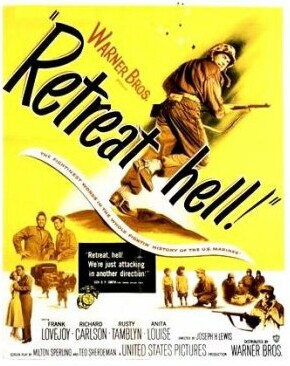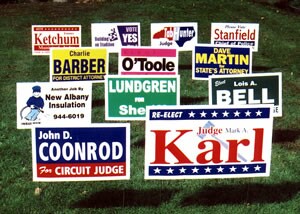 It happened to us again. We were working with a client, taking them five steps forward when without warning, they took six steps back. They went fleeing from the banks of the Promised Land back to where their advertising wasn’t producing maximum results, but at least it was “safe” and nobody in management would complain.
It happened to us again. We were working with a client, taking them five steps forward when without warning, they took six steps back. They went fleeing from the banks of the Promised Land back to where their advertising wasn’t producing maximum results, but at least it was “safe” and nobody in management would complain.
Holy smokes, they were almost there, with a new campaign that would cut through the clutter like a hot knife through butter. Instead, they opted for the same direction they’ve always followed. We don’t take it personally. We’ve worked with this client for a number of years, and we really like the people. But each year, we pray this time maybe they’ll take the path less traveled and finally move their brand from a me-too to a me-only! And then the bugle blows, “Retreat, retreat!”
There’s an old saying: “The devil you know is better than the devil you don’t.” I hate that saying. I hate that is pardons marketers from being exceptional. It only contributes to the soggy, bland mess that fills 95.6% of the available ad space. It makes people hate advertising and love the fast-forward button on their DVRs.
I have a challenge for you if you’re the one responsible for advertising at your company. Pick up the next five magazines you encounter, go through each one and tear out the ads that really stop you, that speak to you on some gut level, that make you salivate for the product. I don’t care if they’re ads for panty hose, shaving cream or body bags, just as long as you love the ads. Tear out the ads and put them in a folder. Then the next time you have an ad to create for your company, pull out those ads and see if these don’t inspire you to do better. And the moment you feel the need to retreat, look at those ads again for inspiration to boldly stand apart and be noticed.
It may help you to remember that they’re the ones that caught your attention while you ignored the other 95.6% which lost their respective companies lots of money in production and media expense.
We say, again and again, Dare to be Different. Maybe it would be better if we said, Dare not to be invisible. Dare not to retreat into marketing nothingness. Dare not to do what everybody else does and blend into the background by your own choice.
We Dare ya.
 I’m so glad it’s over. Probably like you, my home phone was being called at an increasing rate the closer that we got to Election Day. Candidate faces and names were everywhere and on everything from direct mail to lawn signs, outdoor boards to TV and radio commercials. As annoying as it was, there were a number of messaging strategies and tactics that caught my attention because they were executed exceedingly well, which we as marketers should consider adding to our communication toolkits for use tomorrow, next week or next month. For as we all know, your customer and prospects are still being bombarded with marketing messages each and every day by both you and your competitors.
I’m so glad it’s over. Probably like you, my home phone was being called at an increasing rate the closer that we got to Election Day. Candidate faces and names were everywhere and on everything from direct mail to lawn signs, outdoor boards to TV and radio commercials. As annoying as it was, there were a number of messaging strategies and tactics that caught my attention because they were executed exceedingly well, which we as marketers should consider adding to our communication toolkits for use tomorrow, next week or next month. For as we all know, your customer and prospects are still being bombarded with marketing messages each and every day by both you and your competitors.
So let me share with you some strategies and tactics used by politicians leading up to November 6th that are worth remembering.
1) Understand the takeaway
Truth is, these folks do have some things to teach us marketers, particularly regarding messaging. They see the world a bit differently than we do, and use techniques most people didn’t learn in school or on the job, such as: It’s Not What You Say, It’s What People Hear. You can have the best message in the world, but the person on the receiving end will always understand it through the prism of his or her own emotions, preconceptions, prejudices, and existing beliefs. We focus too much of our energy on finding the best way to sell our message, and too little on understanding the filters consumers have as we deliver it. Political marketers care more about takeaways than inputs.
2) Make it look good
Have you seen the biographic videos produced by the two Presidential candidates? They were extraordinarily well done. A number of other political ads were also well done from a storytelling and video perspective. They stayed on message knowing the one critical point (not 4 or 5 points) that they want to make sure was communicated. The videos were shot and narrated well. They didn’t hire amateurs to do their work but had expert writers and producers creating the content. Like with your business, there’s too much at stake to do cheap stuff because everyone knows what cheap means. People interpret what your company/brands stands for based on the quality of creative and the media channel it’s presented on. Don’t go out until you look good.
3) Be the genuine article
Business marketing sometimes seems to stretch the truth a bit too much. When marketing messages are sufficiently public and sufficiently wrong, the press will get wind and call you on the truth of your marketing. Transparency of your brand could never be more important. It is less about giving the appearance of perfection and more about being genuine and human as we build relationships. While it’s critically important to tell your story and the benefits of your product or service, it’s not fine to lie about them. My mom use to tell me “Lies have short legs.” Meaning, you can’t outrun the truth …so don’t stretch it very far.
4) You are who you say you are
In the world of politics, I would argue that there’s nothing as important as branding and having people recognize what the brand stands for. Brand consistency is always maintained. Unlike politicians, too many companies struggle with this, swinging wildly from one branding concept to another. Everything from the taglines, to the logos, to the visuals has been choreographed beautifully. Get your branding figured out right now. Here are a few questions to ask yourself to determine if your branding is clear:
5) Be social..not antisocial
Politicians don’t just post stuff to their respective Twitter or Facebook accounts and hope people will read it. Rather, they actually engage with their social media audience. They post images and video. They have their immediate families and supporters use social media regularly. How is your company using social media to spread the good word about your company? I’ll be the first to say that spending a lot of time, money and resources on social media is not right for every company, maybe even yours, but without some presence, you’re letting the competition become more visible and be seen as a legitimate business partner at your expense.
6) Telling the story again and again
Why are some political ads annoying? Some of it is the content, but I think most of the annoyance is the quantity of political advertising as elections draw near. But politicians know one thing: without a communications budget that allows you to be out in the market in a way that shows you’re “a player”, you won’t get the job done. Far too many companies who do ‘invisible marketing’ base their companies short and long term success on thinking that customers will pick them over a brand that’s actively marketing and better known. The takeaway is that repetition is key …but too much repetition annoys.
As I said earlier, I’m glad the madness of the political advertising season is over but I’m grateful to have learned a few things because each and every day customers and prospects are voting who they want to do business with. Let the winner be you.